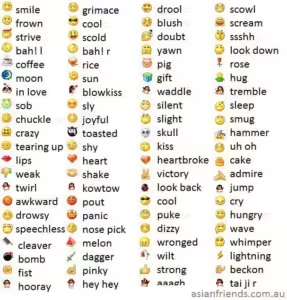The Ultimate Guide to Emoji Meanings: Decode Your Digital Expressions
Introduction- Emoji Meanings
Emoji Meanings – Emojis have revolutionized the way we communicate online, adding nuance and emotion to our messages. But with thousands of emojis available, it can be challenging to understand what each one represents. This ultimate guide will help you decode the meaning behind a wide range of emojis, enhancing your digital conversations.
What Are Emojis? Emoji Meanings
Emojis are small digital symbols used to convey emotions, objects, and ideas in electronic communication. Originating in Japan, they have become a universal language that enriches our text-based interactions.
The Evolution of Emojis – Emoji Meanings
1. From Concept to Standard
Emojis began in 1999 with Shigetaka Kurita’s creation for NTT DoCoMo. These early symbols were designed to express basic emotions and ideas.
2. Global Adoption
The standardization by the Unicode Consortium in 2010 allowed emojis to be consistently used across devices and platforms, making them a global phenomenon.
Popular Emojis and Their Meanings – Emoji Meanings

😊 Smiling Face with Smiling Eyes
Represents happiness, friendliness, and satisfaction. Used to convey a positive mood or to show that you’re pleased with something.
❤️ Red Heart
Symbolizes love, affection, and emotional connections. Often used in romantic contexts or to express deep care.
😢 Crying Face
Indicates sadness, sorrow, or disappointment. It’s used to show that something is emotionally distressing or to express sympathy.
🎉 Party Popper
Used to celebrate special occasions and achievements. It conveys excitement and joy associated with parties and festivities.
👍 Thumbs Up
A gesture of approval, agreement, or encouragement. It signifies that something is accepted or appreciated.
😂 Face with Tears of Joy
Represents extreme laughter and amusement. It’s used when something is incredibly funny or entertaining.
😍 Heart Eyes
Expresses love, admiration, or infatuation. It’s used to show that you find something or someone absolutely delightful.
🥺 Pleading Face
Conveys a sense of begging or pleading. Often used to show vulnerability or to request something earnestly.
😎 Smiling Face with Sunglasses
Signifies coolness, confidence, or relaxation. It’s used to convey that someone is feeling stylish or laid-back.
😭 Loudly Crying Face
Represents intense sadness or emotional pain. It’s used for expressing profound sorrow or to highlight something tragic.
🥳 Face with Party Horn and Party Hat
Denotes celebration and party mood. It’s used to mark a joyful event or achievement with a festive spirit.
😜 Face with Stuck-Out Tongue and Winking Eye
Indicates playful teasing or joking. It’s often used to show that something is meant in a lighthearted or mischievous way.
😰 Anxious Face with Sweat
Conveys anxiety, stress, or nervousness. Used when feeling overwhelmed or under pressure.
🧐 Face with Monocle
Represents curiosity, scrutiny, or being meticulous. It’s used to show that something is being examined carefully.
🤔 Thinking Face
Used to express contemplation, curiosity, or puzzlement. It’s often employed when pondering a question or considering something.
🙌 Raising Hands
Symbolizes celebration, praise, or excitement. It’s used to express enthusiasm or approval, often in response to good news.
💔 Broken Heart
Represents heartbreak, sadness, or emotional pain related to romantic or personal relationships.
🚀 Rocket
Signifies progress, ambition, or excitement about a new venture. It’s often used to convey rapid advancement or enthusiasm.
🌈 Rainbow
Symbolizes hope, diversity, and positivity. It’s used to represent inclusivity or to convey a sense of optimism.
🌟 Star
Represents excellence, achievement, or something special. It’s used to highlight outstanding qualities or to denote something impressive.
🌹 Rose
Symbolizes love, romance, or appreciation. Often used in contexts related to affection or admiration.
🐱 Cat Face
Represents cuteness, playfulness, or affection related to cats. It’s used to express fondness for feline pets or characteristics.
🦄 Unicorn
Symbolizes uniqueness, magic, and fantasy. It’s often used to convey something extraordinary or rare.
💡 Light Bulb
Represents ideas, innovation, or enlightenment. It’s used when discussing new concepts or solutions.
📚 Books
Symbolizes learning, education, or reading. Often used to represent academic pursuits or literary interests.
🔒 Lock
Represents security, privacy, or something that is restricted. Used to indicate confidentiality or something that is not accessible.
How Emojis Enhance Communication Emoji Meanings
1. Adding Emotional Depth
Emojis add emotional nuance to text, clarifying tone and intent. This helps to avoid misunderstandings and makes digital communication more expressive.
2. Bridging Communication Gaps
Visual symbols help bridge language barriers by providing a universal means of expression. Emojis facilitate understanding across different cultures and languages.
3. Personalizing Digital Interactions
Using emojis personalizes messages, reflecting individual style and mood. This makes conversations more engaging and relatable.
The Future of Emojis – Emoji Meanings
As technology and culture evolve, so will emojis. New symbols will continue to be added to reflect societal changes, ensuring that emojis remain relevant and inclusive.
Conclusion – Emoji Meanings
Emojis are more than just fun icons; they are powerful tools for enhancing digital communication. Understanding their meanings helps you use them effectively, making your messages more impactful and engaging. Embrace the full spectrum of emojis to enrich your online interactions and connect with others in meaningful ways.
